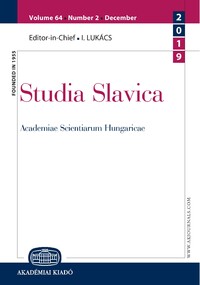Węgiersko-polskie dialogi w twórczości Lwa Węglińskiego
Hungarian–Polish Dialogues in Lew Węgliński’s Heritage
Author(s): Rostysław RadyszewskyjSubject(s): Polish Literature
Published by: Akadémiai Kiadó
Keywords: Węgliński; Hungarian songs; translations; Hungarian region
Summary/Abstract: The paper deals with the work of Lew Węgliński (1827–1905), a poet of the Polish–Ukrainian borderland, who published 6 collections in the Ukrainian language written in the Latin alphabet, and 7 books in Polish, which were dominated by the imaginary material created through appeals to the history and culture of different nations as well as translations of national poetry and folklore. The collection Snopek z niw słowiańskich i obcych (1885) is entirely devoted to translations of Slavic folklore: Ukrainian (42), Moravian (69), Hungarian – “the foreign field” (21), German (60) folk songs. In the introduction, Lew Węgliński described Hungarian songs as “fiery, witty, passionate”, and then cited the translations of Hungarian war songs called Erotki wojskowe – Na placu ćwiczeń, Pod czas marszu, Epikurejka and others. Lew Węgliński informed that his translations of Hungarian folk songs were a Suplementum (the attachment) to volume two. The contents of the collection Echo z-za Tatr i Karpat (1885) are presented in great detail and entirely devoted to the history, folklore, and literature of Hungary, which the author considers to be the most friendly neighbouring country to Poland. After the Arcadian epigraphs in German, the Introductory Word and the Explanations, he compares the Hungarian songs with the folklore of others nations, including Slavic. Lew Węgliński describes the positive facts of the Polish–Ukrainian dialogue, in particular refers and cites the speech Do parlamentu Węglińskiego petycja o wyswobodzenie Polski. The poetic material of the collection is divided into two parts: “original” works (44 poems) and Erotic songs based on Hungarian motifs (almost 100 poems), while the second section Free translations and imitations is also divided into parts From Hungarian folk songs and From Sándor Petőfi (50 poems).
Journal: Studia Slavica Academiae Scientiarum Hungaricae
- Issue Year: 65/2020
- Issue No: 2
- Page Range: 327-340
- Page Count: 14
- Language: Polish
- Content File-PDF

